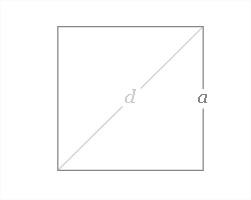C Program to Calculate the perimeter of a square – In this distinct article, we will brief in on the multiple ways to calculate the perimeter of a square in C Programming.
In this blog, we have given suitable examples and sample programs for you. The compiler has also been added in order to understand the codes little better.
The ways in which the calculations can be done are as follows:
- Using Standard Method
- Using Functions
- Using Pointers
- Using Macros
As we all know, a square is a 2-dimensional quadrilateral figure whose sides are all equal and the opposite sides are parallel. Each angle of a square is equal to 90 degrees.
This is what a square looks like:

As you can see, this square has “a” as its side length. Hence, the perimeter of a square is as follows:
Perimeter = a + a + a + a = 4a.
Thus, the methods with which the perimeter of a square is calculated in C programming are as follows:
Using Standard Method
1)The formula for the perimeter of a square is perimeter=4*s.
2)We are calculating the perimeter using the same formula by substituting the value “side” which is input to this program
3)The calculated value stored into the variable “perimeter”
|
1 2 3 4 5 6 7 8 9 10 11 12 |
#include<stdio.h> int main() { float side,perimeter; printf("enter side of square: "); scanf("%f",&side); perimeter=4*side; printf("POS: %f\n",perimeter); return 0; } |
|
1 2 |
enter side of square: 20 POS: 80.000000 |
Using Functions
1)Here the function is float perimeter(float s), which is having float variable as argument and it returns the float value
2)We are calling the function using perimeter(s), here “s” is float type variable, this “s” will pass to the perimeter
float perimeter(float s),calculated perimeter value 4*s will return to p=perimeter(s)
|
1 2 3 4 5 6 7 8 9 10 11 12 13 14 15 16 17 |
#include<stdio.h> float perimeter(float s) { return (4*s); } int main() { float s,p; printf("enter side of square: "); scanf("%f",&s); p=perimeter(s); printf("POS: %f\n",p); return 0; } |
output:
|
1 2 |
enter side of square: 5 POS: 20.000000 |
Using Pointers
1)Here we are passing the addresses of s,p variables using function perimeter(&s,&p).
2)The values at that address &s,&p will store into pointer variables *s,*p
3)The function void perimeter(float *s, float *p), calculate the perimeter of the square and that value will store into pointer variable *p
|
1 2 3 4 5 6 7 8 9 10 11 12 13 14 15 16 17 18 |
#include<stdio.h> void perimeter(float *s,float *p) { *p=((4)*(*s)); } int main() { float s,p; printf("enter side of square: "); scanf("%f",&s); perimeter(&s,&p); printf("POS: %f\n",p); return 0; } |
output:
|
1 2 |
enter side of square: 10 POS: 40.000000 |
Using Macros
1)the formula 4*s was defined with the name area(s)
2)We have code as p=area(s),but area(s) means 4*s.
3)So p=4*s will be calculated and store into p
|
1 2 3 4 5 6 7 8 9 10 11 12 13 14 15 16 |
#include<stdio.h> #define area(s) (4*s); int main() { float s,p; printf("enter side of square: "); scanf("%f",&s); p=area(s); printf("POS: %f\n",p); return 0; } |
|
1 2 |
enter side of square: 112 POS: 448.000000 |
 Learn Java Java Tutoring is a resource blog on java focused mostly on beginners to learn Java in the simplest way without much effort you can access unlimited programs, interview questions, examples
Learn Java Java Tutoring is a resource blog on java focused mostly on beginners to learn Java in the simplest way without much effort you can access unlimited programs, interview questions, examples


